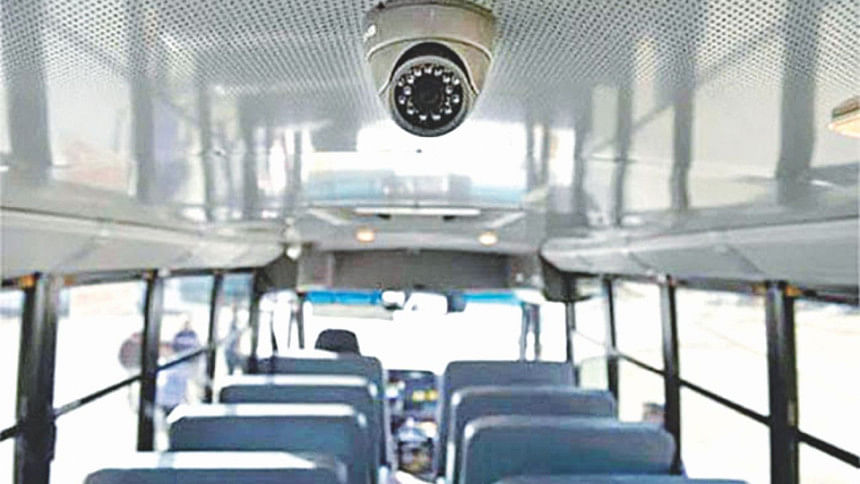Making CCTV cameras mandatory in local buses

The 2012 Nirbhaya incident in Delhi shook the world. The aftermath of this harrowing incident not only raised concerns for female commuters but gave rise to a whole lot of similar incidents. Reports of gang-rape in a similar fashion have surfaced in the busiest corners of Dhaka. Public buses have become the breeding ground for eve-teasers and rapists, carefree of anyone noticing their acts. Claims of rape attempts are likely to go unreported due to lack of evidence. As a means of ensuring public safety, introduction of CCTV cameras in local buses has become a demand of our time.
Installing security cameras at homes and public places have long been an efficient strategy of preventing crimes. Onboard CCTV cameras in buses would mean effective monitoring of passengers. Molesters or rapists would think twice before making a move since they know they are being watched. Moreover, the footage recorded on cameras is valuable evidence which can help a victim identify perpetrators. Many companies are manufacturing CCTV cameras which offer a wide range of camera options suitable for any commercial or passenger vehicle and specifically engineered for mobile applications. Thus, it becomes much easier for keeping record of local routes on a regular basis.
A CCTV aims to increase the perceived risk of capture, a factor which, assuming the offender is behaving in a rational manner, will de-motivate the potential offender.
On a bus, the only authoritative person is the driver. But when this authoritative figure shows his dark-side, the passengers are bound to be helpless. Recent events suggest that rapists are not limited to just male passengers but bus drivers and conductors. In an incident back in 2013, the driver and helper of a bus attempted to rape a readymade garment worker in a running bus at Savar, Dhaka. The driver and helper of another passenger bus were arrested on Monday for their alleged attempt to rape a readymade garment worker.
In 2017, a college girl was raped by five men on a moving bus. Her body was later dumped in Tangail. "The five suspects including the bus driver and supervisor were arrested in a raid in that very night. The victim's mobile phone was with them. The bus too has been seized said OC Shafikul."
On a recent viral Facebook status, one girl claimed that she was a victim of attempted rape on a moving bus in Dhaka. Just when she was about to get down at the last stoppage, the conductor shut the door on her face. The conductor shouted at the driver to increase the speed of the empty bus while he tried to push her to the back of the bus. After a desperate attempt, she managed to open the door and jump off from the speeding bus. Her status included a warning to all working women who tend to take the bus from work.
Initiatives taken around the world
The Lahore High Court of Pakistan ordered the Punjab special education department to get CCTV cameras installed in all schools and buses used for the transportation of children. This was after an incident wherein some deaf children were subjected to physical torture and humiliation by the conductor of their school-bus.
Transport for London operates CCTV cameras in all public transports in London for the purpose of health and safety of employees and customers, prevention of crime and antisocial behaviour, traffic monitoring etc. The images may also be recorded on their computer hard drive or magnetic tape depending on the type of camera for a certain period to assist in detecting crime.
The Bangalore Metropolitan Transport Corporation (BMTC) in India hopes that its plan to install CCTV cameras on about 500 buses will not only ensure safety of commuters but also streamline its operation. Footage would be recorded on a digital video recorder (DVR), which could store the data for a week. This initiative was taken as a response to the Delhi gang rape case.
Recently, the Indian road transport and highways ministry issued draft rules for the same under motor vehicles act regarding installing CCTV cameras and emergency buttons in public buses. These cameras will be connected with global positioning system and GPRS and will be monitored by the local police control room. Such vehicles will also have a panic button.
In April 2014, Bangladesh Road Transport Corporation (BRTC) introduced Wi-Fi on 20 of its buses. Later on, private buses joined and started giving their customers free Wi-Fi service as they travelled. Similarly, if all of the bus owners come together and install CCTV cameras in their buses, it would make a huge impact. Bus companies must know that they can be held liable for not ensuring safety of its passengers. It should be an important part of any public transportation company policy.
Therefore, considering the benefits of security cameras and the possibility of unethical behaviours of some, the government should take it into consideration and make CCTV cameras mandatory. Such systems would ensure greater safety for female commuters in the country.
Aiman R Khan is an apprentice advocate at Dhaka Judge Court.










Comments